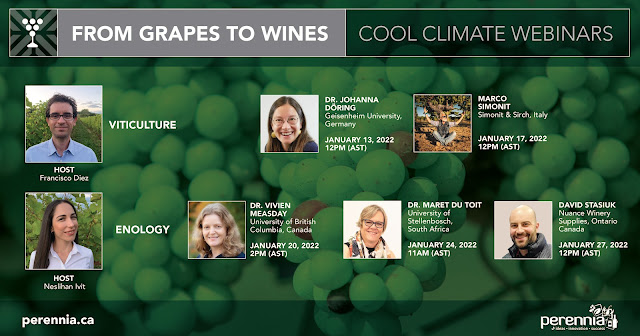We wrapped up 5 planned sessions of From Grapes to Wines Cool Climate Webinars last week. Thank you for your interest and attention in these sessions. We also thank all our speakers, Dr. Johanna Döring (Geisenheim University, Germany), Marco Simonit (Simonit & Sirch, Italy), Dr. Vivien Measday (University of British Columbia, Canada), Dr. Maret du Toit (University of Stellenbosch, South Africa) and David Stasiuk (Nuance Winery Supplies, Canada) for their time, effort and willingness to share their work with all of us.
Our aim of organizing these webinars is to have national and
international professionals to talk about different topics that are of interest
of local grape growers and winemakers. Although our main target is Nova Scotia
wine industry, the sessions were open to all audience. We were happy to see
that the majority of the participants were from Nova Scotia and other provinces
of Canada, but we also had participants from 14 different countries.
One of the advantages of having these sessions online is the possibility to record them. We now have all the recordings of 5 sessions uploaded to our YouTube channel. You can watch them as a playlist from this link.
https://www.youtube.com/playlist?list=PLWHYsBiZD_TIQ3VPclNZnksX-f7xqRL_9
We also would like to share the individual session links, so you
can choose the topics and watch on-demand the recordings that you’re interested
in:
Viticulture:
1) Impact of sustainable management systems on growth, yield, and fruit quality of grapevines
Sustainable management systems such as organic viticulture are gaining more and more importance in the last decades around the world. This is why a field trial was established at Geisenheim University, Germany, in 2006 comparing integrated, organic, and biodynamic viticulture (Vitis vinifera L. cv. Riesling). Dr. Johanna Döring described the sustainable management systems in detail and presented the results from this long-term trial concerning growth, yield, and fruit quality of grapevines in the different management systems.
2) Vine Pruning in cool climate viticulture: principles and techniques for good pruning practices in prevention and management of trunk diseases
Grapevine Trunk diseases are widespread all over the world and growing. They have become a serious threat for viticulture. Among the ways to reduce trunk diseases spread, good pruning practices and techniques are important prevention resources. In the last 30 years SIMONIT&SIRCH has developed and fine-tuned a Vine Pruning Method based on four simple principles that are applicable to all vine training systems. In this session Marco Simonit provided an overview of this method and its application in cool climate, with a look on the future perspectives and new opportunities connected to climate change.
Winemaking:
3) Identification of four distinct S. cerevisiae wine yeast populations from British Columbia’s Okanagan Wine Region
From 2013 to 2018, Dr. Vivien Measday and her team isolated
S. cerevisiae strains from spontaneous wine grape fermentations carried
out with both Okanagan Valley Pinot Gris and Pinot Noir grapes. They used two
genomic methods – microsatellite analysis and whole genome sequencing – to
demonstrate that we have four genetically distinct populations of wine yeast
strains, only one of which is similar to commercial wine strains.
4) Cool Climate Malolactic Fermentation (MLF): What does it mean in the year 2022?
In order to fully leverage the positive impact of the MLF process in cool climate winemaking, it is important to understand the fundamentals of MLF. Dr. Maret du Toit presented the important parameters that can play in determining the success of MLF and the impact on wine aroma: Saccharomyces yeast chosen, non-Saccharomyces yeasts; the lactic acid bacterial species and strains, and the timing of MLF inoculation.
5) No Pressure! Opening winemaking possibilities in Eastern Canada with the Flash-detente technology
David Stasiuk
presented the fundamental principles and practical aspects of the
thermo-flash-détente unit. He shared highlights of the three years of
experience in ON, QC and NB with this equipment in different wineries and
discuss its potential benefits for Nova Scotia. He also shared other usages of
this technology such as cidermaking and processing different fruits.
We hope you enjoy the recordings and find them useful for your business. We’ll be evaluating your feedback from the conducted survey and shape the webinars for 2023. If you haven’t got a chance to fill the survey out, please feel free to e-mail us your comments directly. Thank you!

